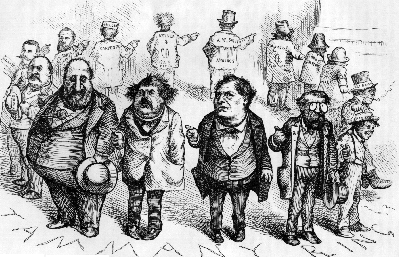 Somewhere in the snowdrift of paper on my desk is a program from an opera performance I attended a few months ago. Among other things, it’s a document that tells you what the opera company is doing and who, specifically, is doing it. It also tells you — less directly — who’s paying, and how. Among other things in it, I found:
Somewhere in the snowdrift of paper on my desk is a program from an opera performance I attended a few months ago. Among other things, it’s a document that tells you what the opera company is doing and who, specifically, is doing it. It also tells you — less directly — who’s paying, and how. Among other things in it, I found:
- a roster of individual donors arranged by the level of support they’ve provided
- a roster of corporate sponsors
- a featured list of corporate sponsors who are underwriting particular activities or programs
- advertisements for various businesses, small and large, often with music-related slogans that are pretty dumb (“our pastries hit a high note”)
- a notice of a business-networking event — a kind of meetup — jointly sponsored by the opera company and the local chamber of commerce
You’ll find similar things in the programs of every large and small opera company, symphony, and theater organization — any arts non-profit, really — in the country. That’s not new; all of those things have been around for as long as I can remember.
What’s that got to do with the LII? Well, in some form or other, all of these things are coming to the LII web site. Some already have. Other things that opera companies have — like admission fees — never will. Here’s why.
The LII’s core staff consists of six people, augmented by a pool of student editors, programming interns, and others who help us run a web site with over a quarter-million documents and 100,000 unique visitors every day. At any given moment, those same core staffers are responsible for one or two funded research projects, a series of consulting jobs, a guest blog, and occasional writing on policy and other matters of academic and public interest. As continually as we are able, we improve our services and our technology. We are spread very thin. About a year ago, we realized that the LII had no prospect of either expansion or field-leading innovation so long as our core staff remains the same size. We had more than fully committed ourselves to the maintenance and continued development of those collections we currently offer. And to some of us it looked very much as though we might end up spending our careers watching others — people with more resources that we can command — doing work that we knew how to do five years ago but could not fund. At a time when there is more need than ever for our expertise and for innovation in the field, this seemed like a pretty bleak prospect. By nature, most of us here are better pioneers than settlers. And we have a lot of unrealized ideas that we would like to bring to you.
So for us the question was not really one of how to stay afloat; we could, we think, tread water indefinitely, although the Internet is usually unkind to those who lose momentum. The problem was, and is, how to move forward, to continue our longstanding traditions of leadership in the field of legal informatics and service to the public. As a practical matter, this amounts to asking, “How will we get more money?” Real leadership demands not only that we support ourselves as we are now, but that we grow. We need more people to carry on our existing programs even as we innovate in new areas. The answer, it seems to us, lies in making use of our considerable traffic and other assets to support our activities, as well as relying on the continued generosity and commitment of our supporters. So we began thinking about what our opportunities might be.
There are, of course, a lot of answers to those questions. We got very interested in what might motivate people to help us. We have always had a loyal core of supporters (thank you, and thank you again!) who believe in the idea of open access to law, and give us money out of pure belief and generosity. We think that some among our donors are partly reimbursing us for a service we offer to their law practice (yes, all you law-firm librarians and small-firm practitioners — we know you’re out there and we very much appreciate your help). And we think that many, many more might take advantage of an opportunity to do well by doing good.
Right now, such folks can help us — and themselves — by listing themselves in our lawyer directory and buying a badge showing their support for the LII; this (not coincidentally) causes them to be shown more prominently in the directory. Very soon, we will begin recruiting sponsors for specific pages in WEX, everybody’s legal encyclopedia, for the LII’s Supreme Court Bulletin, and for our larger collections (if any of these interest you, contact us). And right along we have been making use of a modest Google AdSense presence to bring in some revenue — right now, those little ads are paying for about half a staff person. When we put the AdSense blocks in place, we half-expected to get some negative reaction from our audience. That has not happened. Indeed, a few people have privately told me that they think that our pursuit of more commercial opportunities is just good stewardship of our donated income. I think so too; that’s because I come from the “pray to God but row toward shore” school of assistance-asking.
No doubt this raises some questions. For instance, what about grants? We seem to fall somewhere in between the agendas of those organizations that support basic science (our work tends to involve applications rather than basic research) and those which have social or policy objectives (which tend to have more urgent priorities than legal information). Almost none provide operating support. So it is a small population indeed. We continue to look for good fits (as we have for many years), but we think that these are very infrequent opportunities that will not provide a reliable base. A second, logical question is whether we are contemplating any kind of user fee. The answer to that is a simple “no”. We are building a business model by which we can find reliable ongoing support for open access to legal information, for practical work in legal informatics, and for the promotion of public understanding of law — at no cost to the consumer. Finally, no, this was not a decision prompted by the recession, or by any drying-up of support from other sources. In hindsight, it looks prescient — but we were driven entirely by our collective need for professional fulfillment and our desire to offer more and better services.
So, finally — my thanks to those of you who have been loyal supporters all along. We can’t do this without you, and we don’t think it’s fair to ask you to do it all for us. To those who would like to work with us in other ways, I look forward to hearing from you. And if any of you have questions or suggestions, I’m always eager to hear from you at tom {{dot}} bruce [[at]] cornell {{dot}} edu.





 And then there is the “Tweed Ring” challenge — illustrated handsomely by this Thomas Nast cartoon. Everybody thinks that free legal information is the next guy’s problem. Private foundations think government should do it. Government thinks that it is doing it (via weak services like PACER), and that anything it isn’t doing must be some kind of value-added service that the legal profession should pay for, or a matter of interest only to academic researchers. The legal profession would like to pass research costs on to the clients, and increasingly can’t (small and solo law offices probably never could). And so on.
And then there is the “Tweed Ring” challenge — illustrated handsomely by this Thomas Nast cartoon. Everybody thinks that free legal information is the next guy’s problem. Private foundations think government should do it. Government thinks that it is doing it (via weak services like PACER), and that anything it isn’t doing must be some kind of value-added service that the legal profession should pay for, or a matter of interest only to academic researchers. The legal profession would like to pass research costs on to the clients, and increasingly can’t (small and solo law offices probably never could). And so on.
